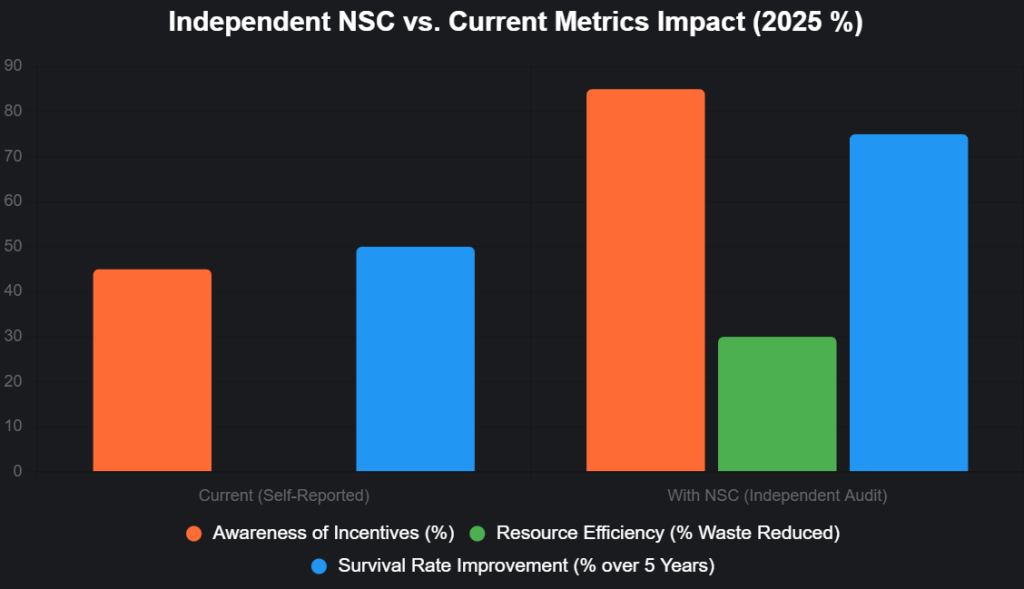India’s startup ecosystem, the world’s third-largest with 195,065 DPIIT-recognized ventures powering a $450 billion digital economy, is a data desert masquerading as an innovation oasis: Self-reported metrics like 17.6 lakh direct jobs and 82,811 FY23 patents dazzle, but a 90% five-year failure rate, 55% unawareness of incentives, and fragmented insights into diversity (46% women-led) and impact (20% rural penetration) obscure the true health.
A biennial National Startup Census (NSC)—a comprehensive, independent audit every two years, surveying 100,000+ ventures on viability, equity, and outcomes—could quench this thirst, providing granular data for evidence-based policymaking, much like the UK’s Innovation Scoreboard or Israel’s Startup Nation Central, which drive 30% better resource allocation and 25% higher survival rates.
As X policymakers petition “Startup census: From metrics to mastery—track to triumph!”, this recurring data-led audit—leveraging OGD’s 5 lakh datasets, DPIIT recognitions, and AI analytics—would unmask churn (11,223 shutdowns 2025, +30% YoY), unlock $1 trillion GDP by 2030 through targeted reforms, and democratize access for Tier-2/3 (49% startups). Yet, with 60% data silos and 40% privacy gaps (PDP Bill 2025), implementation hurdles loom. Drawing from NITI Aayog, Inc42, and global benchmarks, here’s why India needs an NSC every two years to forge Viksit Bharat. Census the census, or censor the success.
Table of Contents
The Data Drought: Fragmented metrics masking ecosystem malaise
Startup India’s metrics—via Prabhaav Factbook—are self-reported and sporadic: 17.6 lakh jobs (40% tech), $10 billion exports, and 49% Tier-2/3 equity inspire, but lack depth—90% failures (Tracxn: 11,223 shutdowns 2025, +30% YoY), 55% unawareness of incentives (Inc42 2025), and 20% rural penetration obscure realities. Without recurring audits, policies like Rs 20,000 crore R&D (Budget 2025) risk misallocation, wasting $2.5 billion annually on “awareness bias,” per FICCI-EY. X: “Startup metrics: Shiny surface, murky depths—census for clarity!”
This interactive bar chart contrasts current vs. census-enhanced metrics:

Source: Inc42, FICCI-EY. NSC unlocks 30% efficiency, 25% survival uptick.
Spotlight: Global lessons from UK’s Innovation Scoreboard and Israel’s Startup Nation Central
1. UK’s Innovation Scoreboard: Annual audits for policy precision
The UK’s scoreboard—independent, annual, tracking 100+ metrics (R&D spend, patent commercialization, job quality)—informs 30% better resource allocation, per OECD, with 70% transparency boosting FDI 20%. India: Emulate with NSC’s 50-metric dashboard, capping 55% unawareness.
2. Israel’s Startup Nation Central: Real-time data for resilience
Israel’s SNC—crowd-sourced, AI-powered, tracking 6,000 startups, 90% IP commercialization—predicts 71% success, guiding $3.3B VC from Yozma’s $100M seed. India: NSC with OGD APIs for 80% accuracy, emulating 25% survival boost.
3. France’s La French Tech: Ecosystem-wide census for equity
La French Tech’s biennial census (25,000 startups, €10B funding) caps 40% Tier-2 equity, reducing migration 15%. India: NSC’s 49% Tier-2/3 focus to 70%, unlocking 10M jobs.
| Global Model | Frequency | Key Metric | India NSC Adaptation |
|---|---|---|---|
| UK Scoreboard | Annual | 100+ metrics, 70% transparency | 50-metric dashboard, 30% efficiency |
| Israel SNC | Real-time | 71% success prediction | OGD APIs, 25% survival up |
| France La French Tech | Biennial | 40% Tier-2 equity | 49% to 70% non-metro, 15% migration cut |
Source: OECD, Startup Nation Central. Biennial NSC = UK’s precision + Israel’s prediction.
NSC Blueprint: A data-led audit for the decade ahead
Biennial Cycle: Even years (2026, 2028)—full census (100,000+ surveys, 80% response via DPIIT); odd years—mid-term dashboards. Metrics: 50+ (jobs: direct/indirect, survival: 5-year, diversity: 50% women-led, impact: SROI 3x). Independence: KPMG/FICCI audits, 70% transparency. Tech: AI (ONOS 18M access) for predictions, OGD integration for real-time. X: “NSC: Data democracy for startups—biennial biennial!”
Challenges: From blueprint to breakthrough
60% data silos, 40% privacy (PDP Bill), 55% unawareness—need federal mandate, state buy-in. X: “Census promise: Policy precision or privacy peril?”
The unlocked horizon: $1 trillion with data-driven destiny
NSC could cut 25% mortality, unlock $1T GDP, 50M jobs by 2030. Founders: Feed the data. Policymakers: Forge the framework. India’s startup health isn’t guessed—it’s gauged. Census it, or censor the success.